

There are some children who are raised in a good nurtured environment and have later developed personalities alike as their parents. CONVERSELY,, there are also some children who are raised in a challenging environment but cultivate personalities which are different than their parents.
"Finding the actual cause-and-effect links between specific actions of parents and later behavior of children is very difficult." Kendra Cherry wrote. Despite these challenges faced, researches have suggested that there are definite links between parenting styles and the effects that these styles brought on children.
Parent-Child Relationship - Why it's Important - Parenting NI. Parenting is the most fulfilling job that we will ever have, but it’s not without it’s challenges.
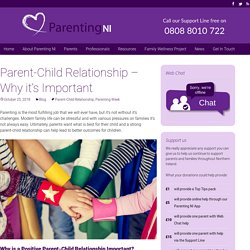
Modern family life can be stressful and with various pressures on families it’s not always easy. Ultimately, parents want what is best for their child and a strong parent-child relationship can help lead to better outcomes for children. Why is a Positive Parent-Child Relationship Important? The Parent-Child Relationship is one that nurtures the physical, emotional and social development of the child. Why Parenting Styles Matter When Raising Children.
Understanding Parenting Styles Can Help You Prepare Your Child for Life. Every parent wants to be the best parent they can be and desires their children to be happy and successful in life.
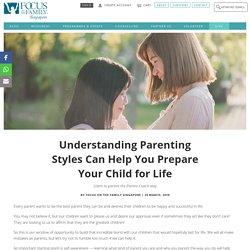
You may not believe it, but our children want to please us and desire our approval, even if sometimes they act like they don’t care! They are looking to us to affirm that they are the greatest children! So this is our window of opportunity to build that incredible bond with our children that would hopefully last for life. We will all make mistakes as parents, but let’s try not to fumble too much if we can help it. National study on emotional resilience, mental health of youths to begin in April - TODAYonline. SINGAPORE — In April, the National University of Singapore (NUS) will embark on the first national study that aims to estimate the prevalence of mental health conditions in youths aged 10 to 18, as well as gauge their emotional resilience.
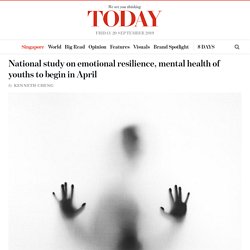
The Singapore Youth Epidemiology and Resilience (Year) Study, done in collaboration with the Ministry of Education and the Institute of Mental Health, will reach out to 12,000 youths, to get a representative sample across gender, ethnicity and socio-economic status. Speaking to reporters on Monday (Jan 21) on the sidelines of the NUS International Academic Psychiatry Conference, Associate Professor John Wong, the study’s principal investigator, said that there is a “data gap” here on the prevalence of mental health conditions for those aged 18 and younger.
Identity development, which is tied to a host of emotional issues, will be examined. The data could help the agencies to deal with emerging trends and challenges as well. How Parental Love Impacts Flourishing Later in Life. Over the past several years, the Human Flourishing Program at Harvard University has pursued research on parenting practices and how these practices affect the flourishing of children as they grow and develop into adulthood. article continues after advertisement A common division of parental styles classifies them along two axes: parental warmth, on the one hand, and parental discipline, on the other.
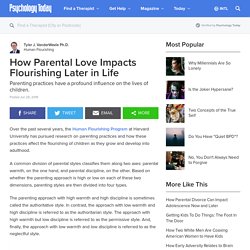
Based on whether the parenting approach is high or low on each of these two dimensions, parenting styles are then divided into four types. The parenting approach with high warmth and high discipline is sometimes called the authoritative style. In contrast, the approach with low warmth and high discipline is referred to as the authoritarian style. HuffPost is now a part of Oath. How parenting style affects child's growth, Education News. Smaller families in Singapore, leading to unhealthy parenting styles. SINGAPORE: It really didn’t seem that long ago when the Stop at Two campaign was in full swing, warning parents in Singapore that “the more you have, the less they (each) get”.
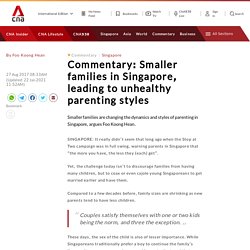
Yet, the challenge today isn’t to discourage families from having many children, but to coax or even cajole young Singaporeans to get married earlier and have them. Compared to a few decades before, family sizes are shrinking as new parents tend to have less children. Couples satisfy themselves with one or two kids being the norm, and three the exception.
These days, the sex of the child is also of lesser importance. While Singaporeans traditionally prefer a boy to continue the family’s lineage, it seems more couples are waking up to the trend that daughters make more caring, homely and reliable caregivers in their old age. Family dynamics are also shifting, as families get smaller. Singapore parenting must evolve, says DPM Tharman as he warns against helicopter parenting, Education News. 6 types of parenting styles and how they affect kids, Lifestyle News. Parenting stress could lead to poor mother-child relationships: NTU study - TODAYonline. SINGAPORE — When parents are constantly stressed about raising their little ones, it could impair their parent-child relationship in the long run.
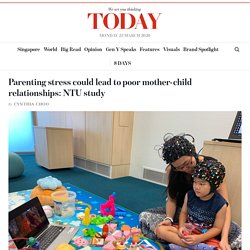
Mothers who reported higher levels of parenting stress, for example, had a weaker connection with their child. These were some of the key findings of a new study done by researchers from the Nanyang Technological University (NTU). By assessing the level of stress among mothers, and then monitoring their brain activity and that of their children while they were watching short animation clips, the researchers observed that mothers who posted higher levels of parenting stress had less synchrony in brain activity with their child. The brain region monitored during the study was the mother and child’s prefrontal cortex, which is associated with the ability to understand other people’s opinions, emotions and values. Tiger mums, helicopter parents and modern child-rearing angst, Opinion News. Growing up in the 1960s and 70s, I had what could be accurately called a carefree childhood.
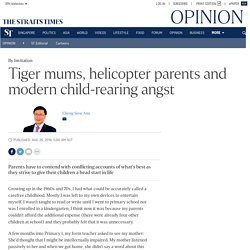
Mostly I was left to my own devices to entertain myself. I wasn't taught to read or write until I went to primary school nor was I enrolled in a kindergarten; I think now it was because my parents couldn't afford the additional expense (there were already four other children at school) and they probably felt that it was unnecessary. A few months into Primary 1, my form teacher asked to see my mother: She'd thought that I might be intellectually impaired.